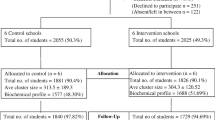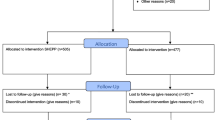Abstract
Objective
To assess the effectiveness of a multi-component school based intervention in improving knowledge and behavioral practices regarding diet, physical activity and tobacco use in middle schoolchildren of rural-Ballabgarh, North-India.
Methods
A total of 40 middle schools were grouped into two, based on geographic proximity and randomly assigned to the intervention or control group in a cluster randomized controlled trial. The target population consisted of 2,348 children studying in 6th and 7th grades in these schools. The intervention consisted of a school component (policies), a classroom component (activities) and a family component [Information Education & Communication (IEC) material]. The main outcome measures were knowledge and behavioral changes in physical activity, diet and tobacco which were self- reported.
Results
Post-intervention, a significant number of intervention schools adopted the tobacco policy (16/19), physical activity policy (6/19) and healthy food policy (14/19) as compared to the control schools (n = 21). Knowledge about physical activity, diet and tobacco improved significantly in the intervention group as compared to the control group. Proportion of students attending Physical Training (PT) classes for five or more days in a week in the intervention group compared to the control group increased significantly (17.8 %; p < 0.01). Proportion of students consuming fruits increased in the intervention group compared to the control group (10 %; p < 0.01). Pre-post decrease in the prevalence of current smoking was significantly more in the intervention group as compared to the control group (7.7 %; p < 0.01).
Conclusions
Healthy settings approach for schools is feasible and effective in improving knowledge and behavioral practices of non-communicable diseases (NCD) risk factors in adolescents in rural India.

Similar content being viewed by others
References
World Health Organization. Global status report on non-communicable diseases 2010. Geneva: World Health Organization; 2010. Available from http://www.who.int/nmh/publications/ncd_report.
Public Health Agency of Canada. The integrated pan-Canadian healthy living strategy. Public Health Agency of Canada 2005. http://www.phac.aspc.gc.ca/hl-vs-strat/pdf/hls-e.pdf. Accessed 21 Oct 2013.
Beaglehole R. Medical management and the decline in mortality and coronary heart disease. BMJ. 1986;292:33–5.
Capewell S, Beaglehole R, Seddon M, McMurray J. Explanation of the decline in coronary heart disease mortality in Auckland, New Zealand between1982 and 1993. Circulation. 2000;102:1511–6.
Boreham C, Robson PJ, Gallagher AM, Cran GW, Savage JM, Murray LJ. Tracking of physical activity, fitness, body composition and diet from adolescence to young adulthood: The Young Hearts Project, Northern Ireland. Int J Behav Nutr Phys Act. 2004;1:14.
Guo SS, Chumlea WC. Tracking body mass index in children in relation to overweight in adulthood. Am J Clin Nutr. 1999;70:145s–8.
Global Youth Tobacco Survey-India- Surveillance and information system 2006. Non-communicable diseases and mental health. Regional Office for South-East Asia. World Health Organization. 2006. Available at: http://www.searo.who.in/en/section174/section2469/section2480-14169.htm. Accessed 20 May 2013.
Sinha DN, Gupta PC, Pednekar M. Tobacco use among students in Bihar (India). Indian J Public Health. 2004;48:111–7.
Kuriyan R, Bhat S, Thomas T, Vaz M, Kurpad AV. Television viewing and sleep are associated with overweight among urban and semi-urban South Indian children. Nutr J. 2007;6:25–9.
Kumar S, Mahabalaraju DK, Anuroopa MS. Prevalnce of obesity and its influencing factors among affluent school children of Devangere city. Indian J Community Med. 2007;32:15–7.
Shah P, Misra A, Gupta N, Hazara DK, Gupta R, Seth P, et al. Improvement in nutrition related knowledge and behavior of urban Asian Indian school children: findings from “Medical education for children/Adolescents for Realistic prevention of obesity and diabetes and for healthy ageing” (MARG) intervention study. Br J Nutr. 2010;104:427–36.
Reddy KS, Arora M, Perry CL, Nair B, Kohli A, Lyte LA, et al. Tobacco and alcohol use outcomes of a school based intervention in New Delhi. Am J Health Behav. 2002;26:173–81.
Perry CL, Stigler MH, Arora M, Reddy KS. Preventing tobacco use among young people in India: Project MYTRI. Am J Public Health. 2009;99:899–906.
Gentile DA, Welk G, Eisenmann JC, Reimer RA, Walsh DA, Russel DW, et al. Evaluation of a multiple ecological level child obesity prevention program: switch what you do, view and chew. BMC Med. 2009;7:49. Available at http://www.biomedcentral.com/1741–7015/7/49.; Accessed 20 June 2013.
TeVelde SJ, Brug J, Wind M, Hildonen C, Bjelland M, Perez Rodrigo C, et al. Effects of a comprehensive fruit and vegetable-promoting school-based intervention in three European countries: the Pro Children Study. Br J Nutr. 2008;99:893–903.
Singhal N, Misra A, Shah P, Gulati S. Effects of controlled school-based multi-component model of nutrition and lifestyle interventions on behavior modification, anthropometry and metabolic risk profile of urban Asian Indian adolescents in North India. Eur J Clin Nutr. 2010;64:364–73.
The Cigarettes and Other Tobacco Products (Prohibition of Advertisement and Regulation of Trade and Commerce, Production, Supply and Distribution) Act, 2003. An act enacted by the Parliament of Republic of India by notification in the official Gazzette. (Act 32 of 2003).
Winkleby MA, Feighery E, Dann M, Kole S, Ahn D, Killen JD. Effects of an advocacy intervention to reduce smoking among teenagers. Arch Pediatr Adolesc Med. 2004;158:269–75.
Global Adult Tobacco Survey India Report 2009–2010, Ministry of Health and Family Welfare. New Delhi: Government of India; 2010.
Saraf DS, Nongkinrih B, Pandav CS, Gupta SK, Shah B, Kapoor SK, et al. A systematic review of school based interventions to prevent risk factors associated with non-communicable diseases. Asia Pac J Public Health. 2012;24:733–52. Available at http://aph.sagepub.com/content.; Accessed 20 Oct 2013.
Acknowledgments
The authors thank all the students and teachers of various middle schools in the region and the school administration for their cooperation in carrying out the intervention.
Contributions
The study was conceptualized by AK, SKG, BN, DSS, CSP and SKK. Subjects were enrolled by DSS under supervision of AK, SKG and BN. Implementation of the intervention was done under the guidance of AK, SKG, BN, CSP, SKP, SKK. Data was analysed by DSS. All authors contributed to the manuscript. AK will act as guarantor for this paper.
Conflict of Interest
None.
Source of Funding
All India Institute of Medical Sciences, New Delhi.
Author information
Authors and Affiliations
Corresponding author
Additional information
Trial registration agency: Clinical Trial Registry of India (CTRI)
Trial registration number: CTRI/2012/08/002882
Rights and permissions
About this article
Cite this article
Saraf, D.S., Gupta, S.K., Pandav, C.S. et al. Effectiveness of a School Based Intervention for Prevention of Non-communicable Diseases in Middle School Children of Rural North India: A Randomized Controlled Trial. Indian J Pediatr 82, 354–362 (2015). https://doi.org/10.1007/s12098-014-1562-9
Received:
Accepted:
Published:
Issue Date:
DOI: https://doi.org/10.1007/s12098-014-1562-9




